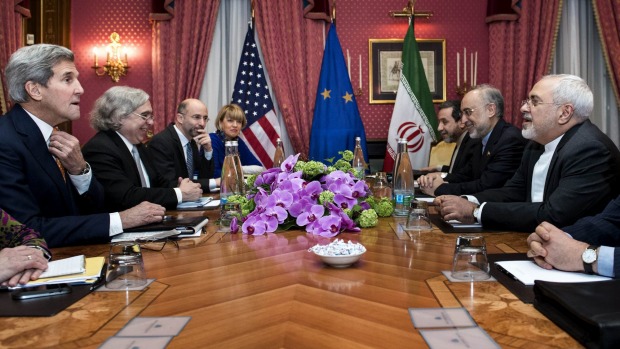UPDATES
This deal with Iran would risk a nuclear nightmare
April 13, 2015 | Glen Falkenstein

Glen Falkenstein
Canberra Times – April 13, 2015
Iran and the P5+1 negotiators have reached an “understanding” for the framework for a final deal to limit Iran’s pursuit of nuclear weapons. Or have they?
The unsigned non-binding “framework” has not been published, and different participants are putting out fact sheets about what has been agreed that contradict one another. Statements from the US, Iran, France do not agree on how long Iranian enrichment will be restricted, what will happen to Iran’s existing enriched uranium stockpiles, when sanctions will be lifted, how intrusive inspections will be, whether Iran is allowed to continue to research advanced much-faster centrifuges or on whether Iran has to provide long-sought answers to the International Atomic Energy Agency (IAEA) about past weaponisation efforts.
In other words, it is very clear that the current framework “understanding” lacks sufficient clarity for anyone to be able to say that it will lead to a final deal that will reliably prevent Iran gaining a nuclear weapon.
Here’s what we can say with certainty. The framework put forward allows Iran to keep its industrial-size nuclear infrastructure, including illegally built facilities, and does not unequivocally facilitate inspection of Revolutionary Guard and military facilities where the IAEA suspect that weaponisation activities have taken place. Even if one generously assumes Iran will comply exactingly with the terms of a deal, once the deal expires, so will the limits on production of nuclear fuel. As US President Barack Obama himself said in a recent interview, “in year 13, 14, 15” of the deal, Iran will be allowed to “have advanced centrifuges that enrich uranium fairly rapidly, and at that point, the breakout times would have shrunk almost down to zero”. In other words, under the proposed agreement, Iran is expected to be a screw turn away from nuclear weapons in just over a decade.Things won’t stand still in the meantime, even if the deal works as expected.
Things won’t stand still in the meantime, even if the deal works as expected.
Officials in Saudi Arabia have indicated that the Kingdom, among other states, may seek to acquire equivalent nuclear capabilities or nuclear agreements with countries such as Pakistan if Iran continues to pursue nuclear weapons. Tensions between Iran and Saudi Arabia are already heightened over the presence in Saudi-allied Yemen of Houthi rebels who have taken control of the capital and continue to expand their influence southward. The Saudis and other Arab Gulf states feel encircled by Iran – which indirectly controls not only most of Yemen, but maintains extensive power over the governments of Iraq, Syria and Lebanon.
With this agreement essentially endorsing Iran as a nuclear threshold state for the next decade, and then allowing unlimited enrichment afterwards, Saudi Arabia, Egypt, Turkey, and Jordan have all begun in recent months seeking arrangements to gain their own nuclear capabilities. The strategic and proliferation nightmare of a nuclear arms race in an always volatile region – which has moreover imploded into complete chaos in recent years – is looking likely.
Iran has always maintained that its program is for peaceful purposes, despite consensus to the contrary from the IAEA and world powers, compounded by Iran’s overt hegemonic ambitions in the region and support for terrorist groups. Iran is a country which stands accused by various human rights organisations of violently oppressing minorities and political dissidents. I worked for some time as a legal advocate for asylum seekers both here and overseas, and I cannot count the number of men, women and children I met who claimed they fled Iran because they were Christian, Baha’i, atheist, belonged to the LGBTQI community or otherwise expressed an opinion that did not accord with the views of the theocratic regime.
The reality remains, that the P5+1 powers, including the United States, are in a stronger bargaining position than the Iranian regime, having levied sanctions over decades which caused Iran to come to the table. This leverage is only enhanced by the current low price of oil.
The Obama administration clearly views a nuclear agreement as one of its most significant foreign policy achievements and a core facet of its ongoing contest with congressional Republicans. It was clear that, for this reason, large parts of the administration were determined that the negotiating team should came back with an agreement, even one with major shortcomings, rather than empty-handed. Iran, fully aware of the pressures on the Obama administration, have used them to their best advantage.
The final agreement is due to be reached by June 30. Australian Foreign Minister Julie Bishop will be visiting Iran in a week and is in a position, along with many other Western leaders, to make clear to both Iran and our allies that Australia’s national interest demands an effective and comprehensive agreement to ensure Iran cannot subvert nuclear safeguards.
Above all this means that the inspection regime must be watertight – anything other than “anywhere, anytime” inspection rights for the IAEA would invite cheating. In addition, the major sanctions must be kept in place until full Iranian compliance is unequivocal. Claims that Iranian cheating can be met with a rapid sanctions “snapback” are completely unrealistic – once the sanctions are removed, it will be a major diplomatic and political effort taking, at the very least, several months before they could be restored. And Iran must not be allowed to continue working on advanced centrifuges that will make a nuclear breakout vastly easier in future.
The leverage remains to improve this deal – if the P5+1 can hold its nerve and not allow eagerness for an agreement to empower Iran’s negotiators. Australia’s long-standing interests in non-proliferation and a stable Middle East require us to try and convince all involved to use that leverage to make essential improvements.
Glen Falkenstein is a policy analyst at the Australia/Israel and Jewish Affairs Council.
Tags: Iran





